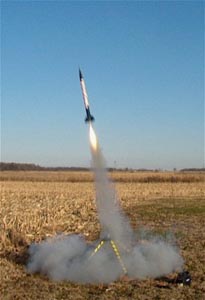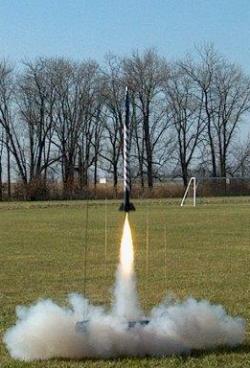| Manufacturer: | Scratch |
 Brief:
Brief:
The RAAM, otherwise known as the "Radical All American Missile", is a
semi-scratch built 2" HPR model that is dual-sized and can fly on a range
of motors from an F40W with the short version to a H180W on the long version of
the model. It was built with left over parts from a recently demised PML AMRAAM
2, but has only the lower fins, hence it is half an AMRAAM, otherwise known as
the RAAM. These reasons are how I came about its name.
Construction:
Recently, I lost my first PML AMRAAM 2 after many launches to a premature
nosecone ejection in mid-flight on an H128W and wound up having a torn Quantum
body tube that was too much trouble to repair. I purchased a replacement AMRAAM
2 kit, which can also be reviewed on the EMRR site, but then was left with a
totally intact rear fin assembly, piston, strap, shock cord and nosecone. The
only components purchased were a PML 2" bulkhead assembly, a PML 2"
coupler, a PML 36" x 2" Quantum Body Tube, a pair of 2.26" x
¼" Acme conformal launch lugs and two 1/8" quick links.
I began by cutting the torn body tube from the old AMRAAM 2, which left a lower section and fin assembly 10" long and completely built, including the still attached piston and shock strap. The inside area was cleaned of old, hard to reach ejection powder and then sanded using 80 grit sandpaper. Next, a PML 2" coupler was cut lengthwise and slipped over the black shock strap, then epoxied into the lower fin body tube assembly so it was flush with the upper motor mount centering ring. This completed the preparation of the lower, left over fin unit.
 Next, I cut
the 36" length of new Quantum body tube into two 18" lengths. One of
the 18" sections of body tube was integrated into the lower fin section. I
roughed up the inside of the body tube, then pushed the piston assembly
completely through the tube. The lower part of the shock strap was covered with
masking tape in case epoxy dripped on it from the next step. 15 minute epoxy
was used to glue it over the split coupler to the fin section, and left me a
completed lower half of the rocket. The masking tape was removed from the shock
strap and I did tape up the outside of the body tube seam until the epoxy set
to help center the tubes with each other. As a last step, the nosecone was fit
to this lower tube and a 1/8" pressure relief hole was drilled through the
body tube two inches below the base of the nosecone.
Next, I cut
the 36" length of new Quantum body tube into two 18" lengths. One of
the 18" sections of body tube was integrated into the lower fin section. I
roughed up the inside of the body tube, then pushed the piston assembly
completely through the tube. The lower part of the shock strap was covered with
masking tape in case epoxy dripped on it from the next step. 15 minute epoxy
was used to glue it over the split coupler to the fin section, and left me a
completed lower half of the rocket. The masking tape was removed from the shock
strap and I did tape up the outside of the body tube seam until the epoxy set
to help center the tubes with each other. As a last step, the nosecone was fit
to this lower tube and a 1/8" pressure relief hole was drilled through the
body tube two inches below the base of the nosecone.
The upper of these two tubes was sanded on the inside at one end and the new PML bulkhead was epoxied inside this upper body tube. In the next step, I coated the bulkhead ply face with a layer of epoxy to make it powder proof and easier to clean. The bulkhead was pushed into the newly completed lower section and fit well. Finally, I installed the original nosecone into the top part of this upper tube, then marked and drilled a pressure relief hole into the upper tube about two inches below the base of the nosecone.
 The lower
section was stripped of the old AMRAAM paint using Acetone and Denatured
Alcohol, then it was sanded with 400 grit wet/dry sandpaper and primed with
Krylon and "Painter's Touch" white primers. About 6 coats of primer
were applied and final sanded with 600 grit. It didn't take much to prime; the
lower fin section was already glassed, sanded and primed prior to building
since it was a leftover. Also, since Quantum tubing was used, the new sections
primed like a dream and only 600 grit sandpaper was needed to smooth them out.
The lower
section was stripped of the old AMRAAM paint using Acetone and Denatured
Alcohol, then it was sanded with 400 grit wet/dry sandpaper and primed with
Krylon and "Painter's Touch" white primers. About 6 coats of primer
were applied and final sanded with 600 grit. It didn't take much to prime; the
lower fin section was already glassed, sanded and primed prior to building
since it was a leftover. Also, since Quantum tubing was used, the new sections
primed like a dream and only 600 grit sandpaper was needed to smooth them out.
I painted the body tube from the blue seam forward in White Krylon Glossy. It was masked at the blue seam so the lower fin section was still primer only. Four coats of white were added, and the last coat was thicker then the rest. Once finished, I let it dry overnight, then masked off the stripes and used Red Krylon Glossy to paint the irregular stripes, which covered in two coats. The nosecone was painted next with four coats of Krylon White Glossy. I then removed the masking from the lower area, masked off the striped upper section and painted this fin area with four coats of Krylon Dark Blue. It left the joint where the blue and White meet seamless, which is what I was shooting for.
The upper section was next. I masked off the area from the top stripes down, then began working on the stars. I used Paintshop Pro to make the stars, then printed them out on paper. The stars were cut out in paper strips, 8 at a time and placed and scotch taped down over a 1" thick strip of masking tape which was laid on a cutting board. I used a Exacto to cut out each star from the masking tape and placed them in the appropriate positions. 4 coats of Krylon Dark blue were painted over the upper section and nosecone and left to sit overnight. Then I removed the masking tape stars and viewed the final product for finish.
Once the model was completely painted, I fastened the shock cord to the piston and used a drop of epoxy to hold it in place. A 1/8" quick link was tied to the cord for quick removal of the parachute and another quick link was added to the bulkhead end. This second quick link at the end allows me to quickly switch the connection from the bulkhead eyebolt to the nosecone, for a "shorty" LMR version of the rocket. I now have a dual purpose/sized model; The shorty version flies on F-G motors and the full version flies on the H motors.
The final touches were added to the rocket; the 24" parachute was attached and the PMR retainer was checked for fit using the original mounts. Also, I marked the spots for the new Acme aluminum launch lugs, then removed the paint and used 15 minute epoxy to attach them instead of the supplied double-sided tape. A stainless ¼" piece of launch rod was used to insure alignment, then the first lug was mounted exactly between the fins and the second lug was mounted mid way up the total length of "shorty" version with the lower tube and nosecone combined.
Flight:

 My rocket weighed in at around 30 oz for the full
version, but I have yet to weigh it for the short version. We converted it to
the short version for it's first flight on a F40-7W, prepped it and placed it
on the pad. The F40 was a very good choice as the model lifted well; it was a
very good launch, however, the delay was too long for it's weight and didn't
eject until it was nose down but the model faired without a scratch. The next
flight was a real test of stress; A G64-10W was built and loaded into the rear
of the model and it was placed on the pad. When it lit, it was an ANIMAL of a
motor for this rocket, the best launch of the day with perfect deployment and
landing.
My rocket weighed in at around 30 oz for the full
version, but I have yet to weigh it for the short version. We converted it to
the short version for it's first flight on a F40-7W, prepped it and placed it
on the pad. The F40 was a very good choice as the model lifted well; it was a
very good launch, however, the delay was too long for it's weight and didn't
eject until it was nose down but the model faired without a scratch. The next
flight was a real test of stress; A G64-10W was built and loaded into the rear
of the model and it was placed on the pad. When it lit, it was an ANIMAL of a
motor for this rocket, the best launch of the day with perfect deployment and
landing.
The next launch was at our first Tripoli Mid-Ohio meet for 2001. The LONG version was configured, then I prepped a H128W with a medium delay and the rocket was prepped and motor was installed. Also, when loading the motor case, I did NOT use all the black powder ejection charge. The piston ejection system actually requires less ejection charge and PML includes a chart for reference when loading the charge.
After waiting patiently, the rocket was placed on the pad and then came its turn. The RAAM left the pad like a shell shot out of a cannon; fast, loud and very straight, but not quite as fast as my A2. It was an awesome launch, with the sound and white smoke billowing out the tail.
Recovery:
The RAAM reached apogee and had a perfect ejection; it then floated safely to
the ground. Estimated altitude was around 2600 feet and it was a very good
flight. Upon examination, the rocket came out of it without a scratch and I
look forward to many more launches with this sturdy bird. It was late, so the
RAAM was the last launch of the day for us, but there will be more to come.
Summary:
The RAAM turned out to be one great flier! It is a stable rocket, somewhat over
stable in its long 55" airframe with CG 4 body tubes ahead of CP when
loaded. The shorty version also makes an excellent everyday flier for mid-power
loads and it is a blast on a G64W. But, convert it to full length in seconds
using the quick links and you have a very stable rocket that can easily compete
with the Mirages and others out there, and compete well. In summary, if you
loose a rocket, don't just throw away the pieces, but rather use the leftovers.
Who knows, you may just be able to build one of these RAAM's, a truly
"Radical All American Missile"!
 |
 |